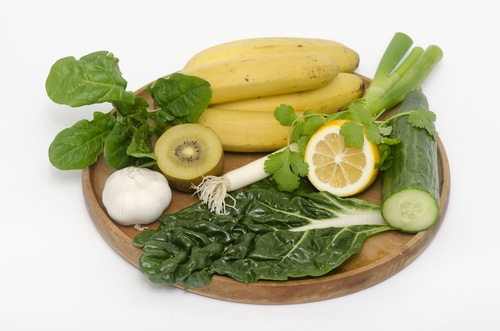
What Types of Food Are Alkaline?
Many fruits and vegetables are considered to be alkaline because they have a low acid load. In contrast, foods with a high acid load (acidic) include most dairy products, meat, fish and whole grains. Advocates of an alkali diet suggest consuming 75% alkaline foods and only 25% acidic foods with a high acid load. The belief is eating a mostly alkaline diet makes it easier for your body to stay in its ideal pH range of around 7.4.
Is there evidence to support this? Proponents of an alkali diet believe that modern diets with their emphasis on processed foods subject our body to a higher acid load than is healthy. To compensate for this, your body has to make adjustments to “buffer” the acid load and restore normal blood pH. Fortunately, your body has buffering systems in place to quickly bring the pH back to normal when it goes up or down. Your lungs play a role in doing this as do your kidneys and bones. The premise is eating too many acidic foods places an extra burden on these buffering systems, and over time they may not be able to function as effectively.
Is an Alkaline Diet Better for Your Bones?
One way your body buffers acid is by releasing phosphate ions. Most of the phosphate ions in your body are bound to calcium ions in your bones. To buffer acid, calcium phosphate is released from bones so the phosphate can do its job of buffering and return blood pH to normal. The bad news is calcium is also released and is lost in your urine – not a good thing when it comes to the health of your bones. Based on this, proponents of the acidic diet argue eating an acidic diet increases the risk for osteoporosis. On the other hand, if you’re eating a calcium-rich diet and getting enough vitamin D, your intestines will simply absorb more and it’ll end up back in your bones.
There’s lots of debate about whether acidic diets contribute to osteoporosis or loss of bone density and whether alkaline diets are protective. The most recent research doesn’t support the idea that acidic diets directly contribute to bone loss in healthy people. An acidic diet DOES increase calcium loss from the urine but this doesn’t seem to impact bone health in normal people. Where it may have an impact is in people who don’t get enough calcium and vitamin D in their diet to replace calcium lost in the urine. In fact, some studies show protein, classified as acidic, is important for maintaining bone mass in elderly people.
Alkaline Foods: Do They Help to Preserve Lean Body Mass?
At least one study shows that eating an alkaline diet that emphasizes potassium-rich vegetables and fruit helps preserve lean body mass in older adults. In this study, older adults that consumed more alkaline fruits and veggies high in potassium had more muscle tissue than those that didn’t. Researchers point out that a high dietary acid load over time may contribute to muscle wasting and age-related loss of muscle tissue. How might this happen? One theory is that amino acids from muscle tissue are mobilized to help buffer an acid load and this leads to muscle breakdown.
The Alkaline Diet and Cancer
Some experts believe acidic diets contribute to cancer. They point out that cancer cells grow more quickly in an acidic environment. The problem is cancer also grows well in an alkaline environment so it’s unlikely that eating an alkaline diet lowers cancer risk based only on changes in pH. On the other hand, there are studies suggesting a diet rich in fruits and vegetables may reduce the risk of some types of cancer. This is more likely due to the natural anti-cancer compounds in these foods rather than their alkalinity.
Is it a Good Idea to Add More Alkaline Foods to Your Diet?
The best reason to add more alkaline foods to your diet is that they’re healthy. Who can argue with eating more vegetables and fruits? Just don’t do it only because they’re alkaline. There isn’t enough evidence to suggest an alkaline diet has benefits solely due to its effects on body pH. Proponents of an alkaline diet argue you need to reduce the amount of protein in your diet because it’s acidic. That goes against recent research showing the benefits of getting adequate protein, especially as we age. Just as preliminary research shows fruits and vegetables reduce the loss of muscle mass with age, protein does too. The strength of an alkaline diet is you’ll eat less processed food and more fruits and vegetables when you follow one – and there are definite advantages to that.
References:
J Environ Public Health. 2012; 2012: 727630.
Eur J Nutr. 2001 Oct;40(5):231-7.
Clinical Nutrition. 2008. 87(3): 662-665.
United States Department of Agriculture. “Plant Foods for Preserving Muscle Mass”
J Bone Miner Res. 2000 Dec;15(12):2504-12.
Am J Clin Nutr January 2008 vol. 87 no. 1 150-155.

